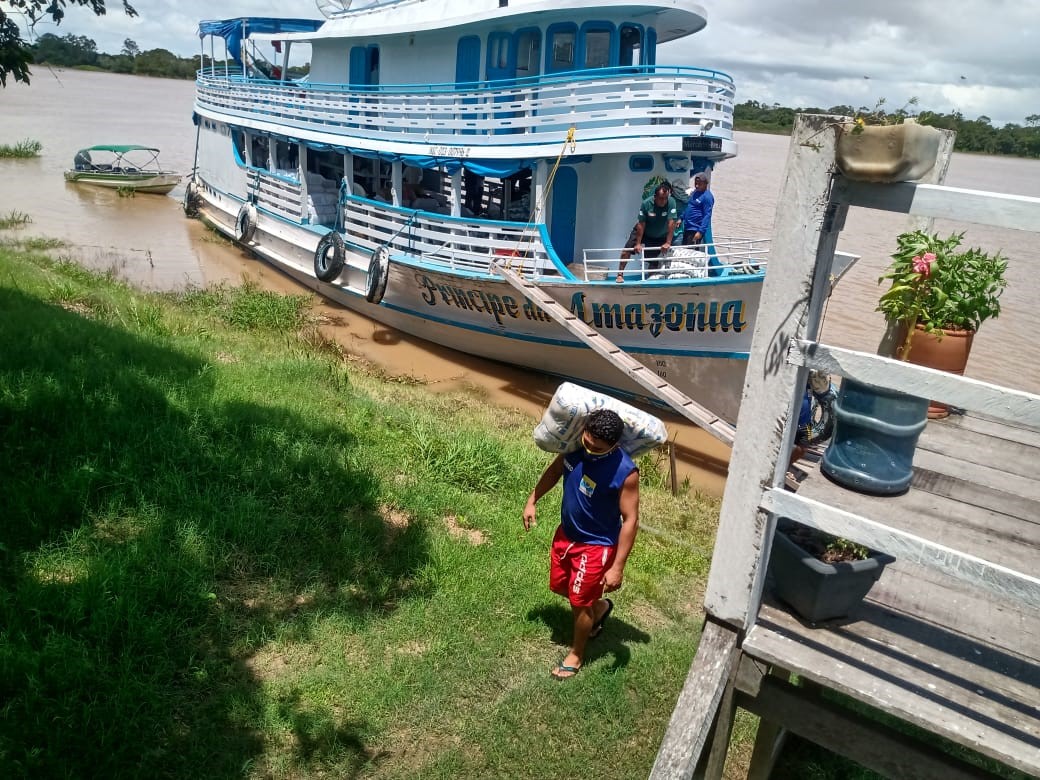(municipality of the State of Pará, Amazonia Region, northern Brazil, population estimated at 308,500 inhabitants)
a) Background
The start of the pandemic and the closure of presential learning spaces and consequently of the offer of all services, including school meals, the different levels of government had to seek alternatives to the health emergency and minimize their negative effects on populations, including the millions of students served by school feeding. This new reality required the implementation of changes in the execution of this policy to deliver food baskets or kits to students and thus ensure the reduction of damage to the food security of students and their families.
b) Activities developed (what, when and where?)
Delivery of food baskets with products from family farming for families of students of the National School Feeding Program (SFP) of Brazil, in the city of Santarém, located in the North of Brazil, in the Amazon region. The activity took place during the pandemic period, in the year 2020, in the city that is the 3rd largest in Pará and the 8th most populous in the North region of Brazil. Santarém serves 438 municipal and departmental schools, with more than 66,000 students in urban and rural areas bathed by various rivers, which imposes logistical challenges.
c) Applied methodology (How?)
Resolution No. 2, published on April 9, 2020, of the National Fund for Educational Development (FNDE/MEC), sought to guarantee the execution of the National School Feeding Program (SFP) of Brazil in the period of crisis. This resolution allowed more than 41 million students in Brazil to continue with this important public policy. The delivery of food baskets was allowed, including products purchased from family farming, which supported the local rural economy in a period of vulnerability and guaranteed the realization of the human right to adequate food.
d) Institutions involved,
National Fund for Educational Development (FNDE) of the Ministry of Education, Municipal Secretariat of Education of Santarém, Departmental Secretariat of Education of Pará, Municipal Secretariat of Agriculture of Santarém, Mayor of Santarém.
e) Qualitative and quantitative data
The Santarém school feeding program serves 438 schools and benefits more than 66,000 students in urban and rural areas and areas bathed by various rivers. The managers mapped local production, organized offices for the producers on how to sell to the SFP, and conducted training so that the farmers could continue to provide food.
f) Description of the beneficiaries (number and public),
66 thousand students of public education in Santarém, Pará. Delivery of more than 126 thousand kits with perishable and non-perishable food.
g) Results achieved
- Guarantee the human right to adequate food for thousands of students.
- Contribution to the food and nutrition security of an important social group in a period of health and economic crisis;
- Support for the local rural economy through public purchases of fresh, healthy and regional products from family farming;
- Adaptation of public calls for the purchase of family farming to comply with security protocols and prevent the spread of Covid-19
- Strengthening of the public school feeding policy due to its flexibility and adaptation to an emergency.
- The case of success is supported by several local initiatives and is generated by all the municipal and departmental actors.
- The leading role played by farmers and the Rural Producers Cooperative of Santarém (Cooprusan), which receives support from the Santarém Technical Assistance and Rural Extension Company (Emater), is also noteworthy.
- Emater’s technical assistance and other support from the Santarém Mayor’s Office, the Federal University of the West of Pará (UFOPA) and the Brazilian Agricultural Research Company (Embrapa) of Cruz das Almas in Bahia are also noteworthy. This alliance guaranteed the success of the farmers in the process of production and commercialization of its more than 75 varieties of products.
h) Challenges and Advances.
Challenges:
- Make food delivery viable with the closure of public institutions and the health crisis caused by Covid-19;
- Mobilizing the technical team to work in the pandemic conditions was also a challenge;
- Develop efficient logistics to reach families living in regions washed by rivers;
- Establish a new purchasing process for family farming, respecting the new security protocols;
- Adapt the law to a new reality never experienced.
Advances:
- Collective work since the creation of Cooperatives;
- Support from Emater, alliance with the University and Embrapa;
- Innovation in public procurement processes;
- Quick decision of the National Fund for Educational Development (FNDE/MEC) allowed flexibility;
- Articulation with various government sectors and institutions for the delivery of the kits.







